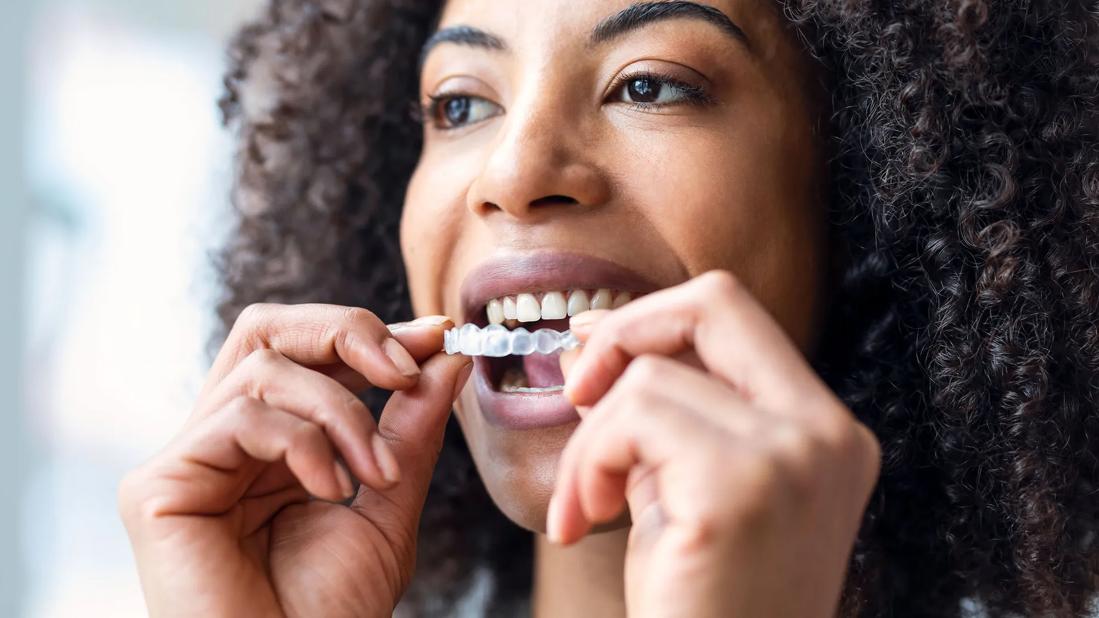You can correct dental issues no matter your age

Image content: This image is available to view online.
View image online (https://assets.clevelandclinic.org/transform/d38cce37-41f4-4b76-8d10-1a613e5b5190/person-inserts-invisiliners-1485180611)
Adult inserting clear dental aligner tray into mouth
When you think of braces, you probably picture a tween or a teenager with the metal brackets and colored rubber bands on their teeth, all in an effort to perfect their smile.
Advertisement
Cleveland Clinic is a non-profit academic medical center. Advertising on our site helps support our mission. We do not endorse non-Cleveland Clinic products or services. Policy
But can adults get braces?
If you’ve never had braces as a child to correct crooked teeth or other dental issues, there’s still time.
Yes, says dentist Anne Clemons, DMD.
“Adults may be candidates for braces or other orthodontics,” stresses Dr. Clemons. “It’s really common to even see someone who had braces in the past have a relapse. Over time, their teeth can shift.”
Some adults may experience dental issues that may be corrected with braces, like:
And your reasons for wanting to correct the position of your teeth may be functional. Your teeth affect your speech and even how you chew, after all. Or you may want to make a change for visual, aesthetic reasons.
Advertisement
Your teeth continue to move and shift no matter how old you are, so there’s no age limit on when you may benefit from braces.
While age isn’t an issue when it comes to braces, there are other factors to consider. You may not be a good candidate for braces as an adult if you currently have the following:
“If you’ve had a history of cavities or gum disease, but it’s been treated and is now stable, you could be a candidate for braces,” clarifies Dr. Clemons. “If we get your teeth in a better, straighter position, they’re easier to clean, they’re easier to maintain and it’s easier to prevent future decay and future gum disease.”
Your dentist can talk to you about which kind of braces are best for you. Options include:
Regardless of what option you choose, the goal is the same.
“With any of those appliances, what we’re doing is using them to deliver gentle, steady forces to reposition teeth,” explains Dr. Clemons.
While braces are effective at correcting your teeth, there are some potential cons to think about, like:
Advertisement
Veneers are a permanent shell that’s placed on the front of your tooth. So, are they a better option than braces?
“With something like a veneer or a crown, we’re not moving teeth. We’re making it look like the teeth are in a different position,” outlines Dr. Clemons. “Sometimes, veneers or crowns can be a great alternative, especially if you have narrow-looking teeth. Instead of moving those teeth close together with braces, a veneer or crown can make the teeth look wider and close the space between teeth.”
But Dr. Clemons emphasizes that there’s not one right answer for everyone, and that your dentist can review the pros and cons of each option with you.
Don’t let age stop you from achieving the smile you’ve always wanted. Braces can be used on adult teeth to correct or fix a variety of dental issues.
“If it’s something that’s on your mind, it’s always worth exploring,” encourages Dr. Clemons. “Your dentist or orthodontist is going to be prepared to discuss your options and take several factors into account to find the right solution for you.”
Advertisement

Sign up for our Health Essentials emails for expert guidance on nutrition, fitness, sleep, skin care and more.
Learn more about our editorial process.
Advertisement
When baby teeth get damaged, these procedures can relieve pain and save space for adult teeth
Benefits typically include bi-annual screenings and lower payments on procedures like fillings and crowns
Silver fillings are perfectly safe
The short answer from a cardiologist
You should take it easy, focus on managing your pain and take care of your incision
Soft foods like mashed potatoes, applesauce and, yes, ice cream won’t disturb your incision
Dental care is not only safe during pregnancy, but it’s also highly recommended
The numbness and tingling should wear off in about two hours
Although it could be used as a moisturizer, this new trend is not recommended
Communicating clear limits helps protect your time, energy and emotional well-being
High cholesterol can be genetic, but testing and treatment can lower your heart disease risk